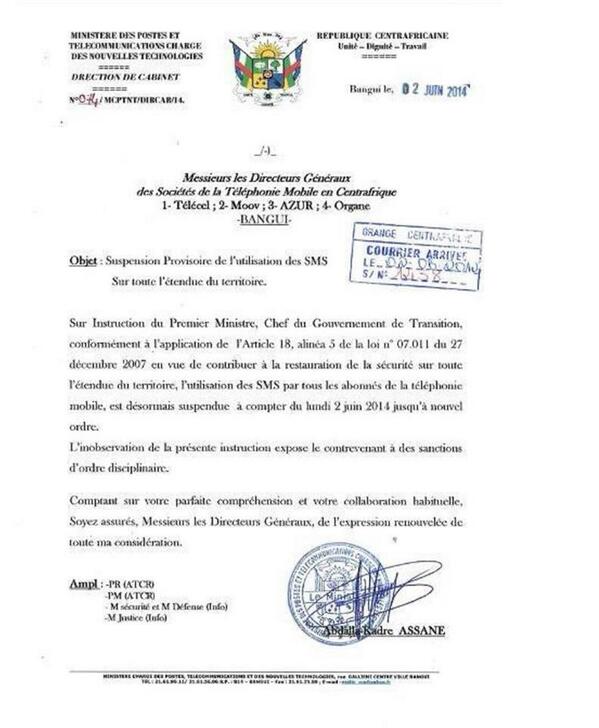Online Africa Weekly Top 10: SMS ban for CAR, cross-network mobile money in Tanzania, Egyptian social media monitoring, and more
A few themes from this past week’s headlines are worth discussing in greater detail.
Social media monitoring in Sudan and Egypt
North African governments continue to struggle with the balance of online freedom and national security. Sudan’s National Telecommunication Corporation (NTC) is conducting technical studies on social networking sites, particularly Facebook and Whatsapp, in a bid to find ways to control their use in the country. Some say the government is fearful that social media hurts its image and leads to further political tension. Similarly, Egyptian authorities are in the process of drafting a plan that would systematically monitor social media. A new constitution allows for the right of privacy, yet such legislation would potentially overrule that right in favor of keeping national security. Minister of Interior Mohamed Ibrahim asserted the decision regarding internet surveillance will not violate freedoms and its sole purpose is to help maintain national security.
Mobile data use in SSA is doubling every year
Ericsson reports that between 2012 and 2013 mobile data use doubled. From 2013 through 2019, data use in Sub-Saharan Africa is expected to grow twenty-fold. Mobile subscriptions will increase from 550 million to 930 million in the same period..
Mobile money interoperability for Tanzanians
In a positive move for consumers, Tigo, Airtel, and Zantel agreed to allow for money transfers across different networks. Such agreements used to be common for voice or SMS, but this is the first such agreement in Africa regarding mobile money transfers.
Is Africa really out-innovating Silicon Valley?
Every other week there seems to be an article penned on how Africa is leapfrogging technology, is a Silicon “Savannah”, or is beating Silicon Valley in certain regards. The truth is that Africa is a hotbed for mobile money platforms and investment in African tech startups is growing every day. Dozens of mobile apps successfully serve local needs. Just look at M-Pesa which is often touted as the world’s first mobile banking service. A platform like M-Pesa is exceedingly useful, but it is still one product. All of Africa’s tech success cannot ride on a handful of such businesses.
Satellites, drones, or balloons…
Google has plans to invest at least $1 billion (more likely a few billion) on low-orbit satellites that will provide Internet access to underserved areas. The news comes after news that the company is thinking of using drones or high-altitude balloons to provide broadband to places like rural Africa. Utilizing satellites to deliver Internet to rural Africa is nothing new; for years VSAT has serve remote areas with high-latency access. However, spending billions of dollars seems extreme given the cost needed to build terrestrial fibre backbone networks and requisite mobile infrastructure is much less. Still, it’s too early to tell if any plans from Google (or Facebook) to provide Internet access will come to fruition given spectrum and other national regulatory challenges.
eLearning Africa Conference held in Kampala
Every year, more than a thousand key e-learning professionals gather to discuss how ICT is enabling education across Africa. This year’s event, held in Kampala, Uganda, boasted 300 speakers. Above all, an annual report on e-learning gives dozens of examples of how ICT is supporting schools, research institutions, and healthcare providers.
Rwanda’s annual ICT Sector Profile
The Ministry of Youth and ICT is doing an excellent job promoting government transparency. Last week, the Ministry released a compilation of ICT indicators that describe a 20% Internet penetration rate and 65% mobile penetration rate. 94% of health centers are connected to the Internet. ICT adoption continues to grow in agriculture and education sectors.
Creating an ICT center is never easy
The Bagamoyo area of Tanzania, located 72km from Dar es Salaam, is slated to become the next East African tech hub – at least according to some. One official claims that 100,000 jobs can be created by multi-national ICT firms once appropriate infrastructure and business environment are in place. Building such a city is not easy and takes decades of commitment – just look at the challenges faced by Kenya’s Konza City!
Cote d’Ivoire mulls mobile telecoms consolidation
Telecoms competition is a must to drive down prices and keep technology current. However, there comes a point when a market simply has too many options. Usually, a couple of companies have a dominant market share with the rest left to struggle for customers. Such is the case in Cote d’Ivoire where the Ministry of Communications is making attempts to combine Comium, Green Network, and Cafe Mobile into a single fourth mobile operator with 1.1 million subscribers (a 6% market share). Such a move would allow for the companies to better compete with giants MTN, Orange, and Moov.
SMS suspended indefinitely in Central African Republic
Amid fears of strike, the Prime Minister of CAR banned SMS capabilities from June 2nd onward using legislation from 2007. The service is temporarily suspended on Telecel, Moov, Azur, and Orange networks. Calls are still possible, but censoring communication is bad practice.













 Twitter
Twitter Facebook
Facebook Pinterest
Pinterest